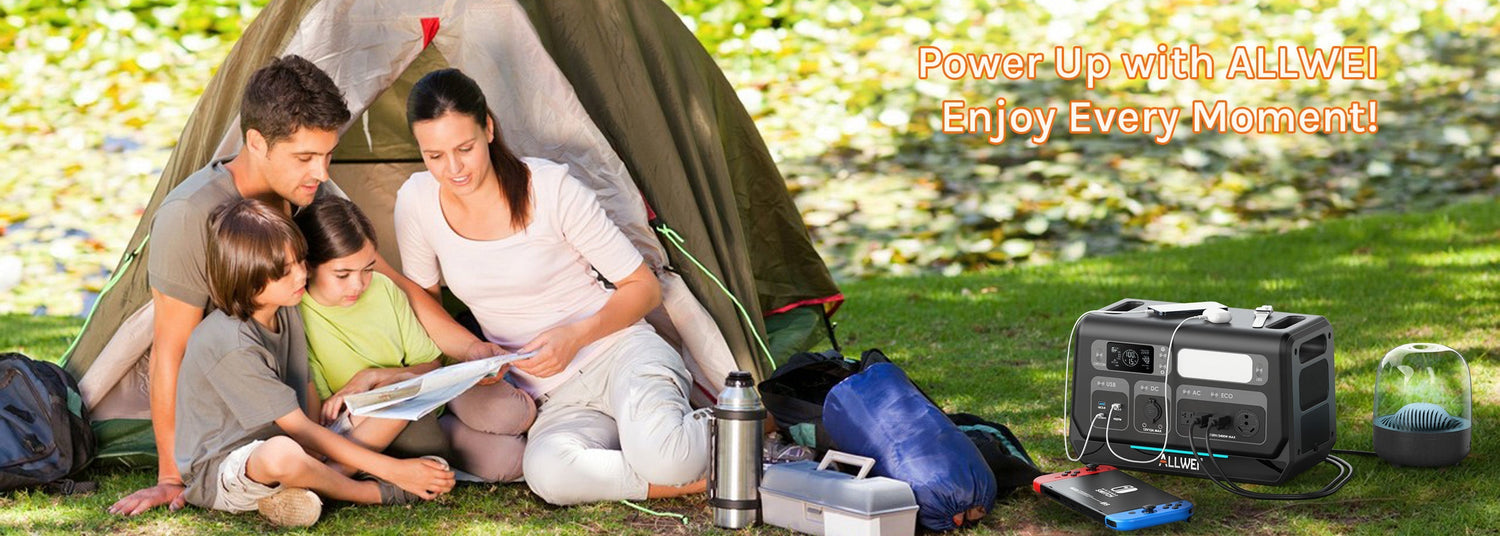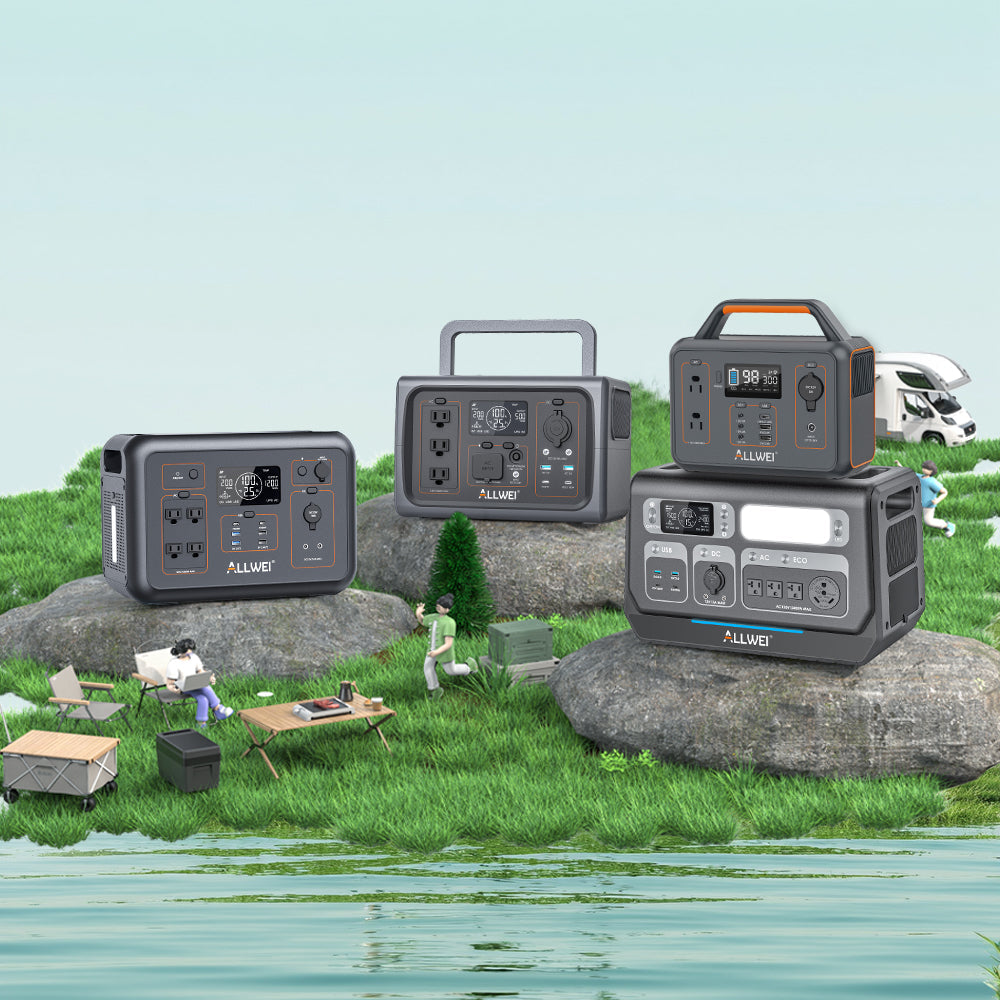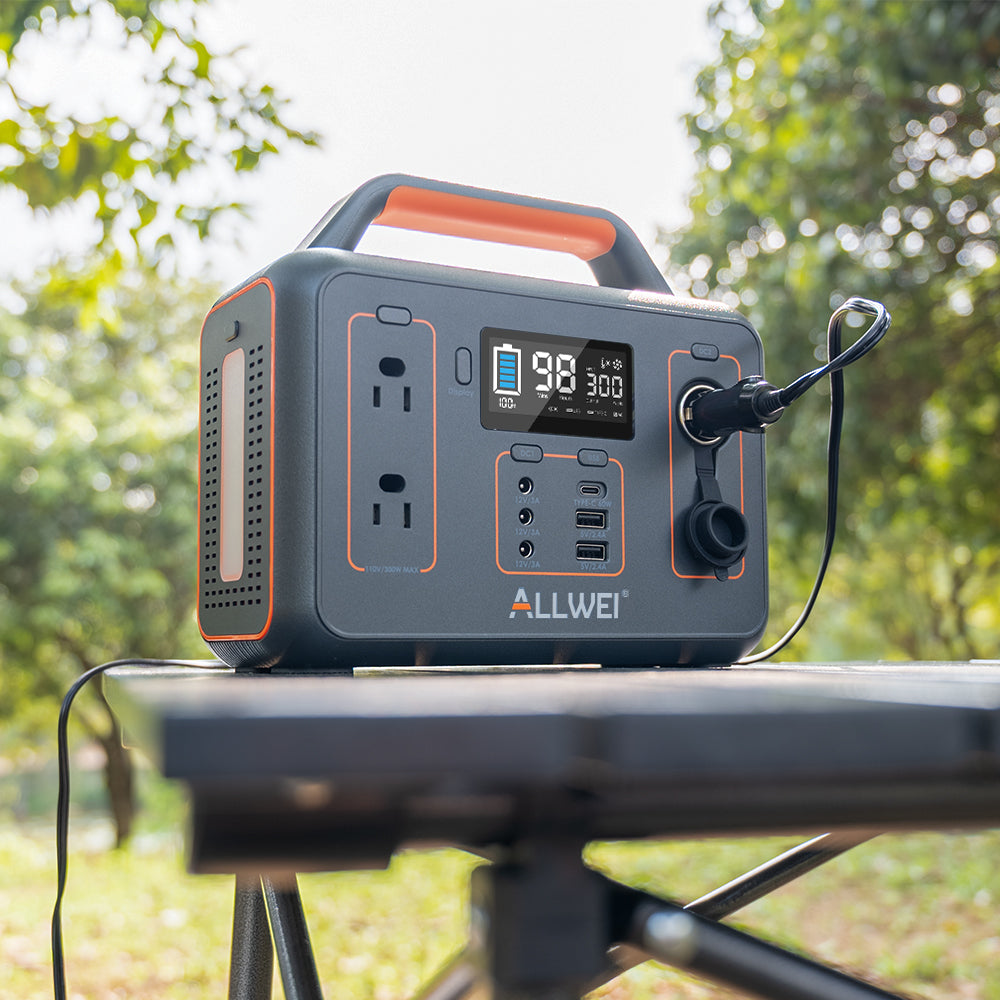Choosing the ideal portable power station depends on your energy needs, preferred use case, and desired mobility. For light users who just need to charge smartphones or LED lights during short outdoor trips, a compact model like ALLWEI's PPS300 or PPS500 may suffice. These units weigh less than 8 lbs and offer around 300–500 watt-hours.
For those living in RVs or planning extended off-grid adventures, higher-capacity models such as the PPS1200 or PPS2400 are ideal. These units deliver up to 2048Wh and can support large appliances, power tools, or even a coffee maker.
Another consideration is recharge options. ALLWEI power stations offer AC wall charging, solar charging via MPPT, and car charging—giving users maximum flexibility. Also look at inverter type; a pure sine wave inverter is essential for safely running sensitive electronics.
Check the number and types of ports: Does it offer fast-charging USB-C? How many AC outlets are available? Is wireless charging included? These factors determine real-world usability.
Understanding Your Energy Requirements
Before diving into specific models, it's crucial to assess your actual energy needs. This involves calculating the power consumption of the devices you plan to use and determining how long you need them to operate. Start by making a list of all the devices you'll want to power, including their wattage ratings and estimated usage time.
For example, if you're planning a weekend camping trip, you might need to power LED lights (5W each) for 6 hours, charge a smartphone (5W) for 2 hours, and run a small fan (20W) for 4 hours. This would require approximately 150 watt-hours of energy. However, it's always wise to add a 20-30% buffer to account for unexpected usage or efficiency losses.
Consider your lifestyle and usage patterns. Are you a minimalist camper who only needs basic charging capabilities, or do you require power for multiple devices simultaneously? Do you plan to use the power station as a backup for home emergencies, or will it be your primary power source during extended off-grid adventures?
Capacity Categories and Use Cases
Entry-Level Models (300-500Wh)
The ALLWEI PPS300 and PPS500 represent the entry point into portable power stations, perfect for users with minimal power requirements. These compact units are ideal for:
Weekend camping trips
Emergency backup for essential devices
Powering small electronics like phones, tablets, and LED lights
Day trips where you need basic charging capabilities
The lightweight design (under 8 lbs) makes these models highly portable, suitable for backpacking or situations where weight is a primary concern. They can easily fit in a backpack or car trunk without taking up significant space.
Mid-Range Models (800-1200Wh)
For users with moderate power needs, models like the ALLWEI PPS1200 offer a sweet spot between portability and capacity. These units are suitable for:
Extended camping trips (3-7 days)
RV living and van life
Powering small appliances like coffee makers, electric coolers, or portable stoves
Supporting multiple devices simultaneously
The PPS1200 can power a 100W device for approximately 10-12 hours, making it capable of running essential appliances throughout the day. This capacity is particularly valuable for families or groups where multiple people need to charge devices.
High-Capacity Models (2000Wh+)
The ALLWEI PPS2400 and larger models are designed for serious off-grid living and extended adventures. These units can handle:
Long-term off-grid living
Powering large appliances like refrigerators, microwaves, or power tools
Supporting multiple high-wattage devices simultaneously
Serving as primary power sources for tiny homes or remote cabins
With capacities exceeding 2000Wh, these models can power a 100W device for 20+ hours, making them suitable for situations where grid power is unavailable for extended periods.
Recharging Options and Flexibility
The ability to recharge your power station is as important as its capacity. ALLWEI power stations offer multiple charging options, each with its own advantages:
AC Wall Charging
The fastest and most convenient charging method, AC wall charging can fully recharge most ALLWEI models in 4-8 hours. This option is ideal when you have access to grid power and need quick recharging between uses.
Solar Charging via MPPT
For off-grid applications, solar charging is essential. ALLWEI's MPPT (Maximum Power Point Tracking) technology optimizes solar panel performance, ensuring maximum energy harvest even under suboptimal conditions. The charging time varies based on panel capacity and sunlight availability, typically ranging from 6-12 hours for a full charge.
Car Charging
Car charging provides flexibility for road trips and mobile applications. While slower than AC charging, it allows you to recharge while traveling, making it perfect for RV users or those on extended road trips.
Inverter Technology and Power Quality
The type of inverter in your power station significantly impacts what devices you can safely power. ALLWEI power stations feature pure sine wave inverters, which are essential for:
Sensitive electronics like laptops, medical equipment, and audio devices
Appliances with motors, such as refrigerators and power tools
Devices that require stable, clean power for optimal performance
Pure sine wave inverters replicate the quality of grid power, ensuring compatibility with virtually all electronic devices. Modified sine wave inverters, while cheaper, can cause issues with sensitive equipment and may produce audible noise in some devices.
Port Configuration and Connectivity
The number and types of ports determine how many devices you can power simultaneously and how efficiently you can charge them. Consider these factors:
USB Ports
Look for USB-C ports with Power Delivery (PD) for fast charging of modern devices. Multiple USB-A ports allow you to charge several devices at once. Some models also include wireless charging pads for added convenience.
AC Outlets
The number of AC outlets determines how many household appliances you can power simultaneously. Consider whether you need standard outlets or specialized connections for specific equipment.
DC Outputs
DC outputs are useful for powering 12V devices commonly used in camping and automotive applications, such as car refrigerators, air pumps, or LED lighting systems.
Additional Features to Consider
Display and Monitoring
A clear LCD display showing battery level, power consumption, and charging status helps you manage your energy usage effectively. Some models offer smartphone apps for remote monitoring and control.
Safety Features
Look for built-in protection against overcharging, short circuits, and temperature extremes. These features ensure the longevity of both your power station and connected devices.
Expandability
Some ALLWEI models offer expandable battery options, allowing you to increase capacity as your needs grow. This feature provides long-term value and flexibility.
Portability Features
Consider the physical design, including handles, weight distribution, and overall dimensions. These factors affect how easily you can transport and store the unit.
Making the Final Decision
When choosing between different models, prioritize your most important requirements. If portability is crucial, start with a smaller model and consider upgrading later. If you need to power specific appliances, ensure the unit can handle their power requirements.
Remember that it's better to have slightly more capacity than you think you need, as power requirements often increase over time. The modular and expandable nature of ALLWEI's systems allows you to start with a smaller investment and grow your capacity as needed.
Conclusion
Selecting the right portable power station requires careful consideration of your energy needs, usage patterns, and lifestyle requirements. By understanding the different capacity categories, charging options, and technical specifications, you can make an informed decision that provides reliable power for your specific use case.
ALLWEI's range of portable power stations offers solutions for every need, from basic charging requirements to comprehensive off-grid power systems. Whether you're planning a weekend camping trip or transitioning to off-grid living, there's a model that fits your requirements and budget.




Leave a comment
This site is protected by hCaptcha and the hCaptcha Privacy Policy and Terms of Service apply.